Physical Address
304 North Cardinal St.
Dorchester Center, MA 02124
Physical Address
304 North Cardinal St.
Dorchester Center, MA 02124
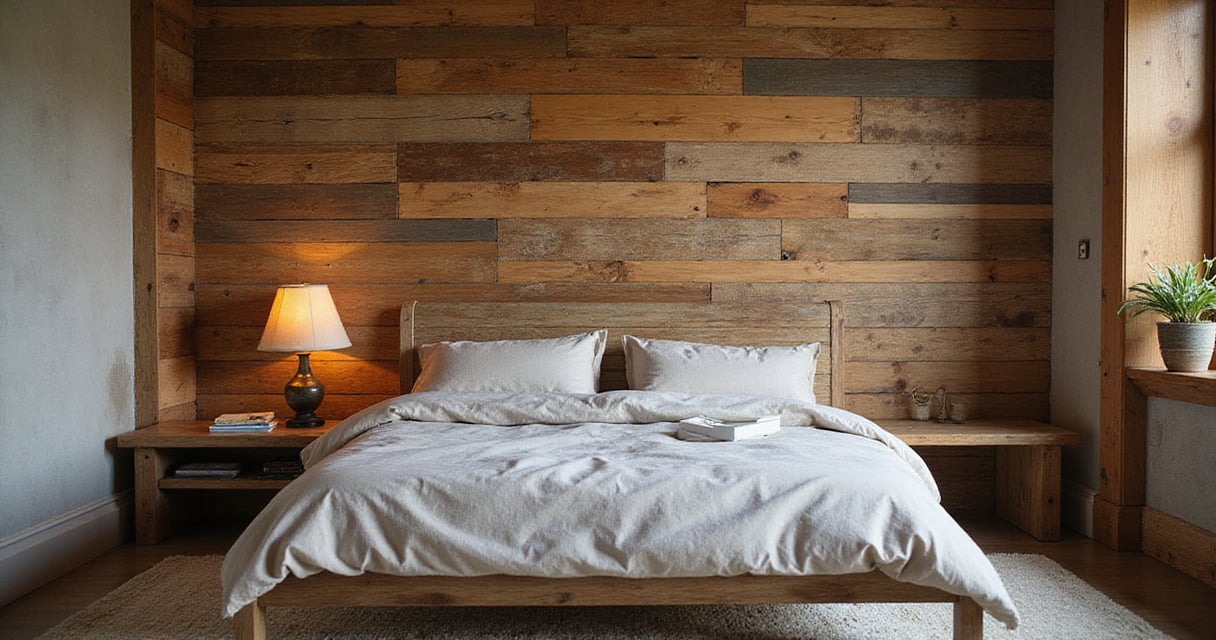
Transform your bedroom into a cozy retreat with these 21 rustic bedroom decor ideas. From reclaimed wood headboards to vintage trunks, discover how to create a warm, inviting space that celebrates natural materials and timeless charm.
Imagine walking into your bedroom and feeling the day’s chaos just…melt away. That’s the power of a truly rustic space. It’s not just a look; it’s a feeling—a deep, grounding connection to something more honest and natural. As an artist, my studio is my productive space, but my bedroom? That’s my sanctuary. It has to be the place where I recharge my creative spirit.
I’ve spent years helping fellow creatives design spaces that work for them, and what I’ve learned is that the best rustic rooms aren’t just collections of weathered stuff. They are carefully considered retreats that masterfully balance the raw with the comfortable, and history with modern life. Most importantly, they tell your story. So, let’s walk through 21 ways to transform your bedroom into that cozy haven you’re dreaming of.
A reclaimed wood headboard is more than furniture; it’s the anchor of your room’s story. I once worked on a studio apartment for a photographer who found gorgeous, grayed boards from an old barn upstate. We built a simple headboard, and instantly, the whole room had a history. The wood’s nail holes, saw marks, and weathered patina bring a character that you just can’t buy off a factory line.

This is the perfect foundation for your Rustic Design. Beyond its beauty, you’re giving timber with a past a brand-new future, which feels right for a style so connected to authenticity. You can mount planks directly to the wall for a floating look or build a simple frame. Either way, this single element sets the tone and gives every other choice a beautiful, storied foundation to build upon.
Let’s be honest, we all crave that irresistible “sink-in-and-stay-awhile” feeling. Faux fur throws and pillows are your fastest route there. The magic is in the contrast—that super-soft, plush texture against the rougher, honest surfaces of wood and metal. It’s what keeps a rustic room from feeling too stark and instead makes it deeply inviting.

But a word of advice: quality matters. Look for high-density faux fur that feels weighty and has fine fibers; it makes all the difference. I love to drape a big, shaggy throw across the foot of the bed and then mix in one or two fur pillows with others made of linen or chunky knit cotton. It creates a layered, touchable landscape on your bed that just begs you to curl up.
The bed frame is the architectural backbone of the room, and you have two incredible options here: wrought iron or solid wood. Wrought iron lends a sense of history and hand-forged craftsmanship. Its dark, sturdy lines look incredible against light-colored bedding, but because the design is often open, it doesn’t feel visually heavy. A solid wood frame, on the other hand, brings an organic warmth that instantly grounds a space.

The key with either choice is to favor simplicity. This isn’t about ornate, frilly details. It’s about letting the material—the beautiful grain of oak or the matte, hand-hammered feel of dark iron—be the star. I’ve noticed this is where people get stuck, thinking they need something elaborate. Trust me, a simple, strong frame makes a much more powerful statement about quality and endurance, which is the true heart of rustic style.
Here’s where you can have some real fun. Instead of a matching furniture set, look for distressed or unfinished wood nightstands. And they don’t have to match! In fact, it’s better if they don’t. I once paired a small, vintage chest on one side of a bed with a simple, three-legged stool on the other. It created this wonderful, lived-in asymmetry that felt so much more personal than a cookie-cutter set.
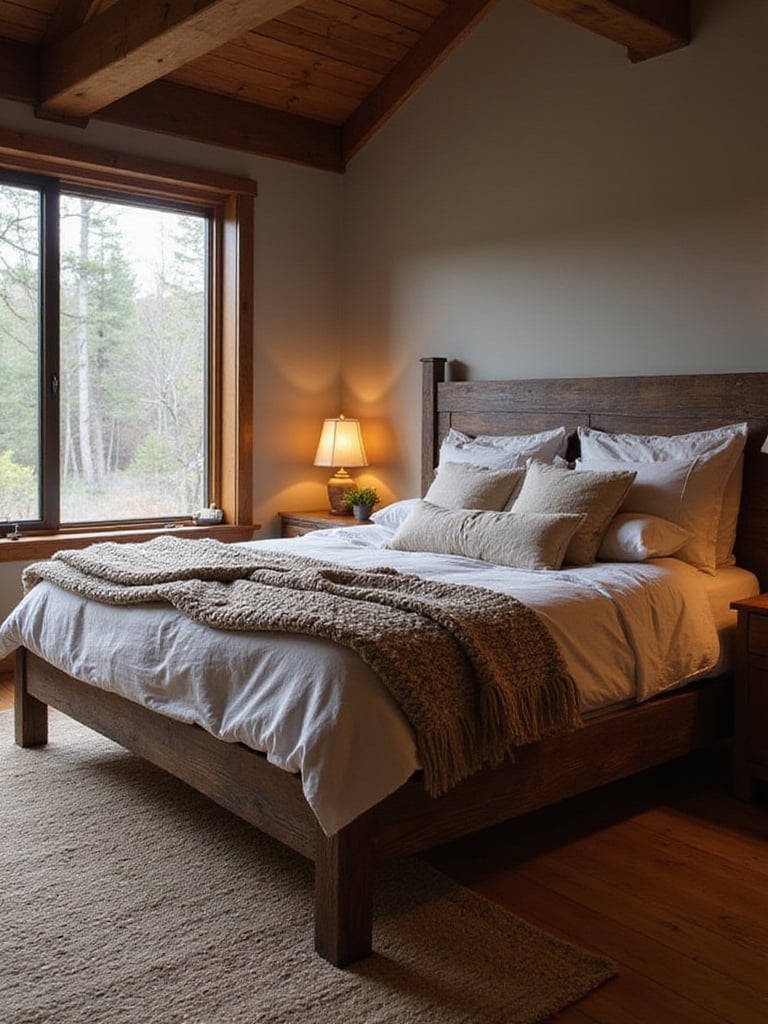
Look for pieces that celebrate their own history—the little nicks, the visible wood grain, the simple, sturdy hardware. You could use a small antique trunk, a stack of old suitcases, or a simple wooden crate. The goal isn’t clutter; it’s character. Keep the tops functional with just a lamp, a spot for your phone, and maybe a single book. This approach celebrates authenticity over perfection, which is a core tenet of rustic design.
Forget “beige.” When we talk about an earthy palette, we’re talking about the rich, complex colors of the natural world. Think of the deep brown of wet soil, the soft gray of a river stone, the muted green of moss on a tree, or the warm terracotta of a clay pot. These are the colors that will make your rustic bedroom feel harmonious and serene.
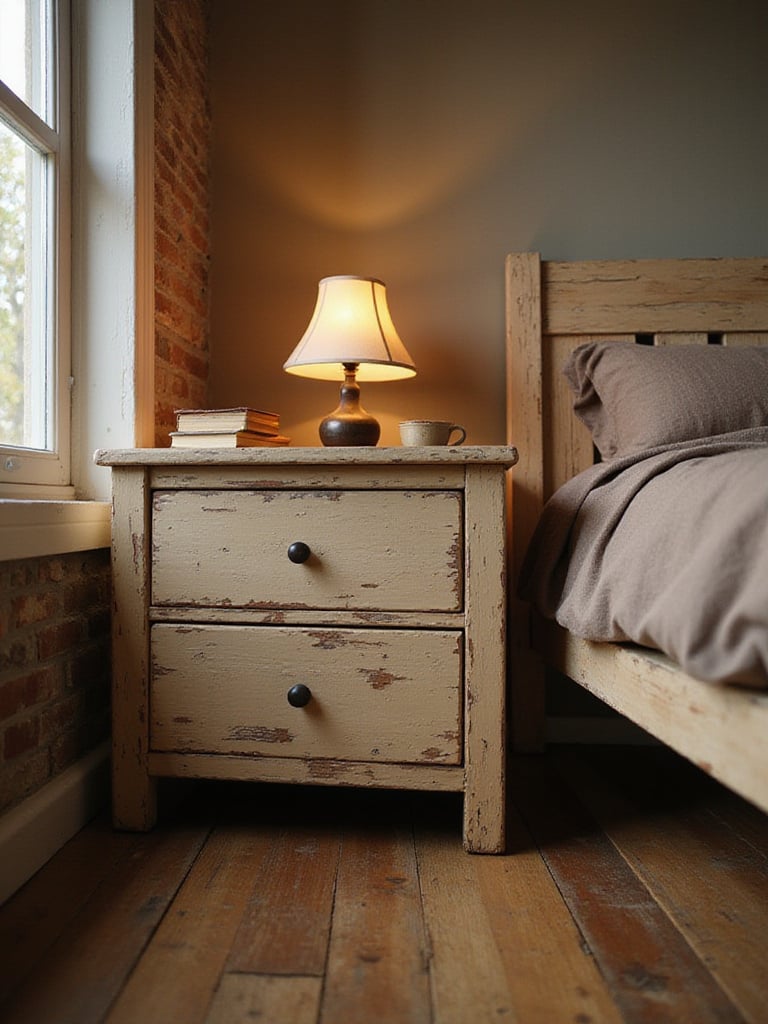
A good way to start is by picking a main neutral—like a creamy off-white or a warm gray—for the walls. Then, layer in those richer, earthier tones through your textiles, art, and accent pieces. You can mix different wood tones in your furniture and layer shades of green with your plants and pillows. These colors have a timeless quality, creating a space that won’t feel dated in a year or two, which aligns perfectly with the sustainable, long-lasting spirit of rustic style.
If wood and metal are the bones of a rustic room, then Natural Textiles are its heart. This is what brings the essential softness and comfort that makes a space a true sanctuary. Think linen, cotton, and wool. Each one brings its own personality: linen has that beautiful, slightly rumpled elegance; cotton is all about versatile comfort; and a chunky wool knit adds incredible warmth and visual weight.

Layering these on your bed is an art form. Start with soft cotton or linen sheets. Add a quilt or a matelassé coverlet. Fold a chunky wool or faux fur throw at the foot of the bed. Finish with a collection of pillows in different textures. It transforms your bed from just a piece of furniture into the undeniable focal point of your cozy retreat.
A new rug can warm up a room, but a vintage rug gives it a soul. An Oriental or vintage rug introduces a layer of refined history that beautifully balances the rougher elements in the room. The intricate patterns and faded, muted colors tell a story. And those little signs of wear? That’s not a flaw; that’s character. It’s proof of a life lived, which is impossible to replicate with something brand new.

When I’m hunting for clients, I look for wool or cotton rugs with timeless patterns and earthy tones that complement the room’s color scheme. Here’s a little secret: a slightly worn vintage rug is the perfect way to make a room feel sophisticated without feeling stuffy. It’s the bridge between rustic simplicity and lived-in elegance.
Lighting is everything. I mean everything. The right fixtures don’t just illuminate a room; they create its atmosphere. For a rustic space, look for fixtures made from materials like barnwood, aged metal, or even antlers. These pieces serve as functional art, adding sculptural interest even when they’re turned off.
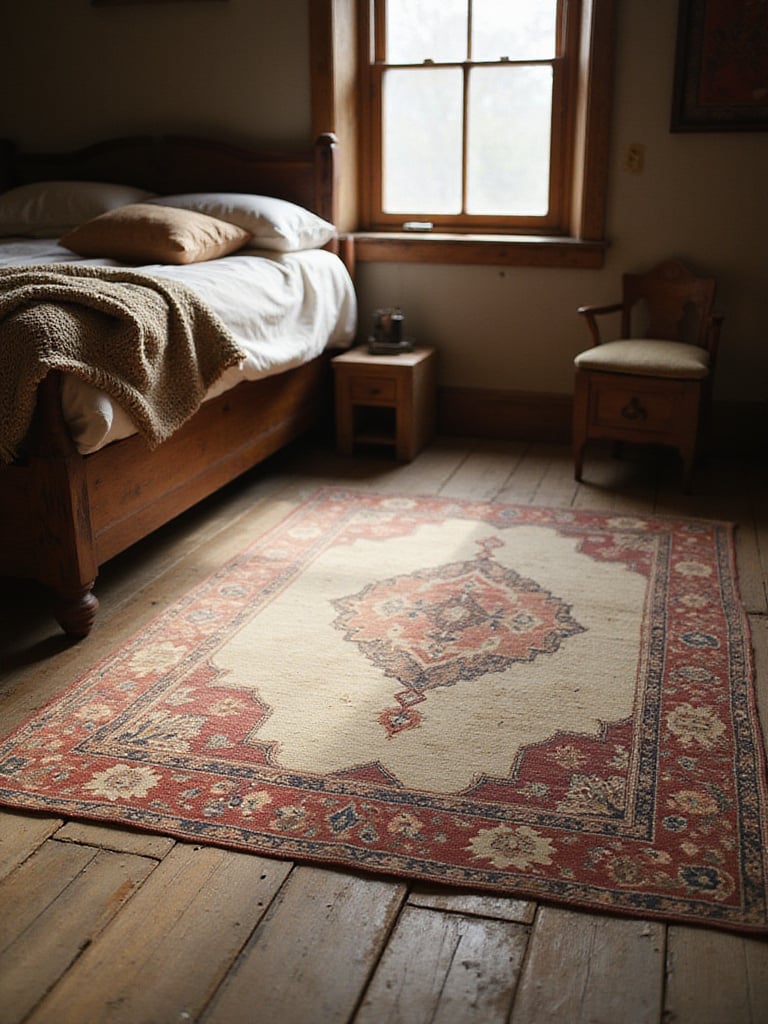
Just as important as the fixture is the quality of the light itself. You want to aim for a warm, amber glow—think the color of firelight or a setting sun (that’s about 2700K-3000K on the light bulb box). Stay away from cold, blue-toned light at all costs! Layer your lighting with an overhead statement piece, sconces by the bed for reading, and maybe a small lamp on a dresser for a soft, ambient glow.
We’ve all had one of those wobbly, particle-board dressers at some point, right? A solid wood dresser is the complete opposite. It’s an investment in stability, warmth, and permanence. Look for simple, clean lines that let the natural beauty of the wood—its grain, its knots, its color—be the main attraction.

Real craftsmanship shows up in the details: solid wood drawer glides that don’t stick, strong joinery like dovetails, and a finish that feels good to the touch. This is a piece of furniture that gets better with age; minor scratches and dings just become part of its story. In a world of disposable everything, choosing a dresser built to last for generations is a deeply rustic statement.
Exposed beams or wood-paneled walls can instantly give a room that cozy, cabin-like feel. They add incredible texture and architectural interest that you just can’t get from a flat, painted wall. Even if your home doesn’t have original beams, you can easily install lightweight faux beams that look remarkably authentic.
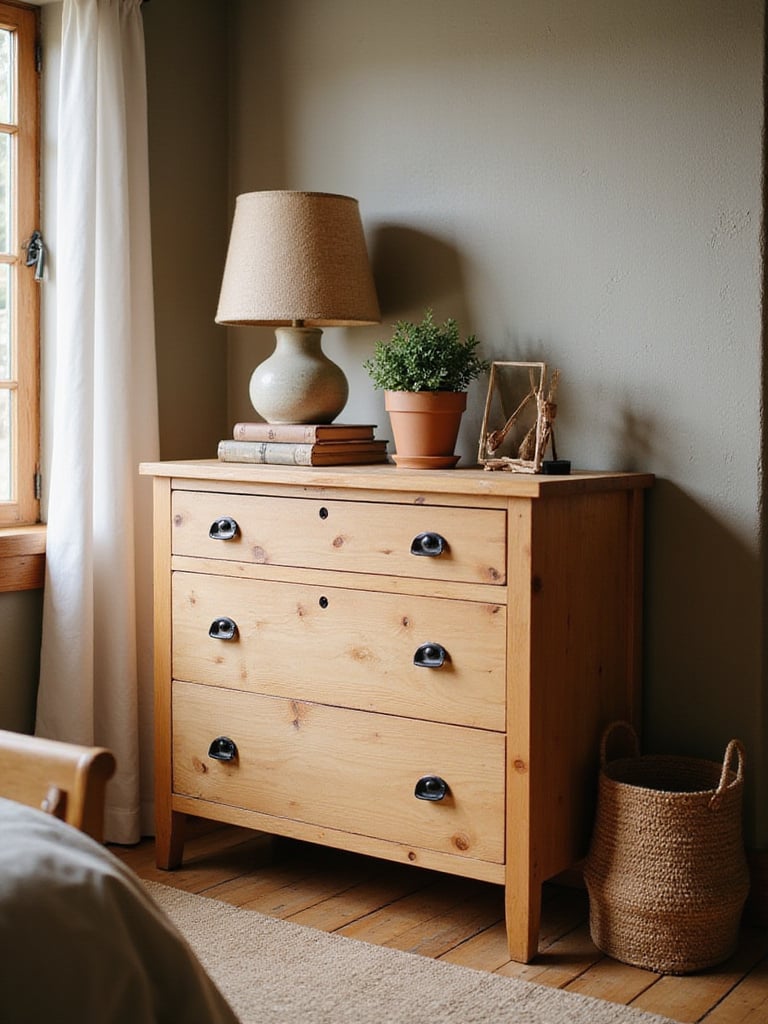
For walls, you have options like shiplap for a clean, farmhouse look, or rough-sawn planks for a more rugged feel. A great trick is to use paneling on just one accent wall—typically behind the bed—to create a powerful focal point without overwhelming the space. Running your hand over that textured surface provides a tactile satisfaction that’s a welcome change from the flat, smooth walls of most modern homes.
A mirror is a designer’s secret weapon. In a rustic bedroom, a large mirror framed in reclaimed wood or aged metal does more than just let you check your reflection. It actively enhances the design by amplifying light and creating a sense of spaciousness, which is especially great for smaller rooms.
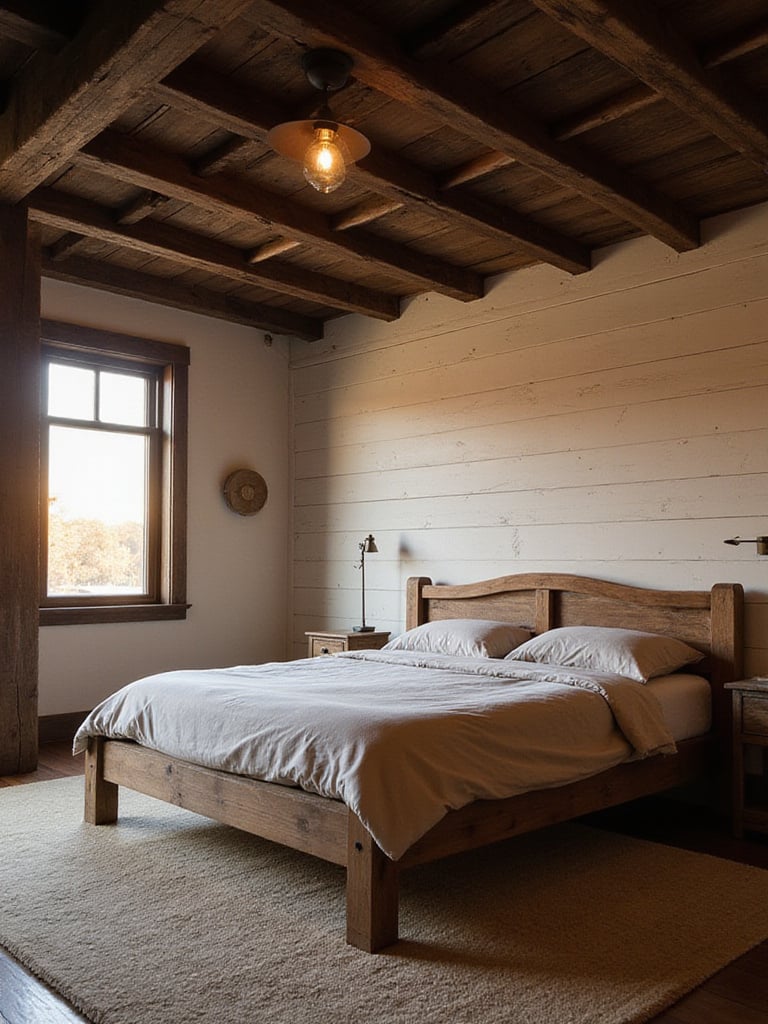
The trick is to think about what the mirror is reflecting. I always try to place a mirror opposite a window. Why? Because it will grab all that beautiful natural light and bounce it all around the room, making everything feel brighter and more alive. It can also reflect a piece of art or a beautiful lighting fixture, effectively doubling its impact. This one simple addition can pull the entire room together.
Art is the final layer of personality in a room, and for a rustic space, turning to nature is always the right move. Think landscape paintings, black-and-white photography of forests, or detailed botanical prints. The specific subject isn’t as important as the feeling it evokes. Choose pieces that make you feel calm and connected to the outdoors.
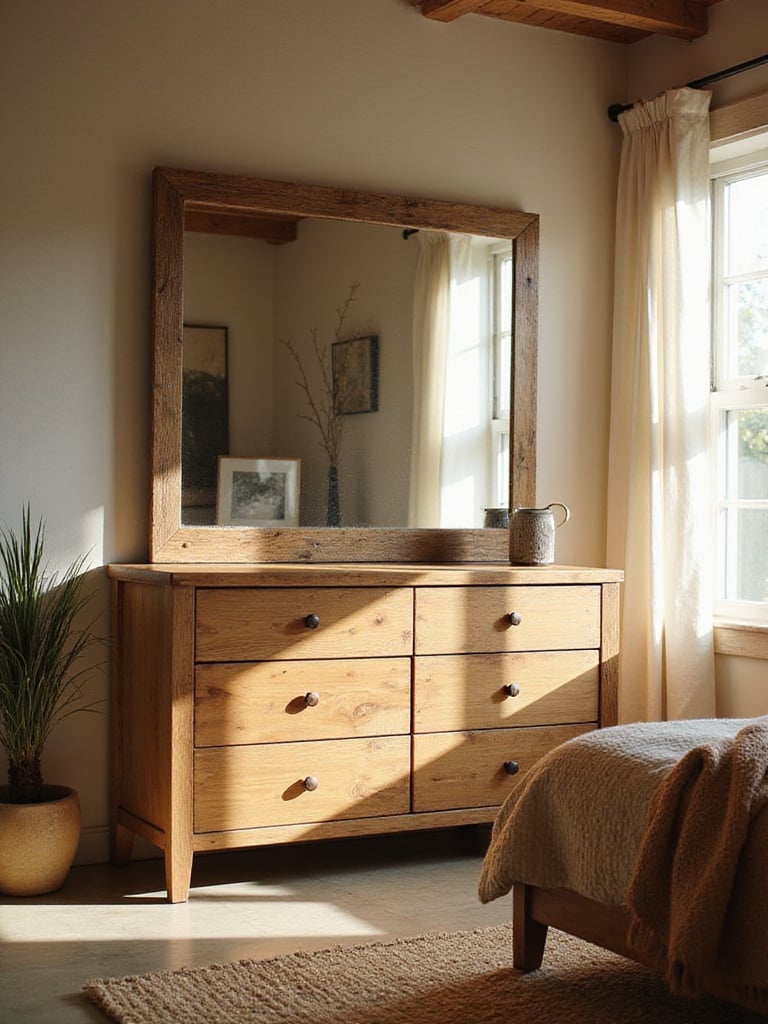
Don’t stop at the art itself; the framing is key. Simple wood frames with visible grain or thin, matte black metal frames work best. You can even get creative by hanging unframed canvases or pinning prints with small clips on a piece of twine. This is the art you’ll see first thing in the morning and last thing at night, so choose something that genuinely brings you peace.
For a wonderfully textural and organic feel underfoot, you can’t go wrong with a natural fiber rug like jute, sisal, or a classic braided rug. Jute brings a beautiful golden tone and a satisfyingly coarse texture, while braided rugs offer a dose of timeless, handcrafted charm. They are both fantastic for grounding a space in earthy, natural style.

These rugs are also incredibly practical. They are durable, often more affordable than wool rugs of a similar size, and their natural texture is great at hiding dirt. If you’re hesitant to commit to a bold, patterned rug, a natural fiber rug provides that crucial layer of texture without competing with your other design elements.
Leather brings a specific kind of warmth and sophistication that just gets better with time. It perfectly complements the other textures in a rustic room—wood, metal, and soft textiles. And you don’t need a lot of it to make a big impact. A leather accent chair in a reading corner, a bench at the foot of the bed, or even just a couple of leather Throw Pillows can add that perfect touch of rugged elegance.
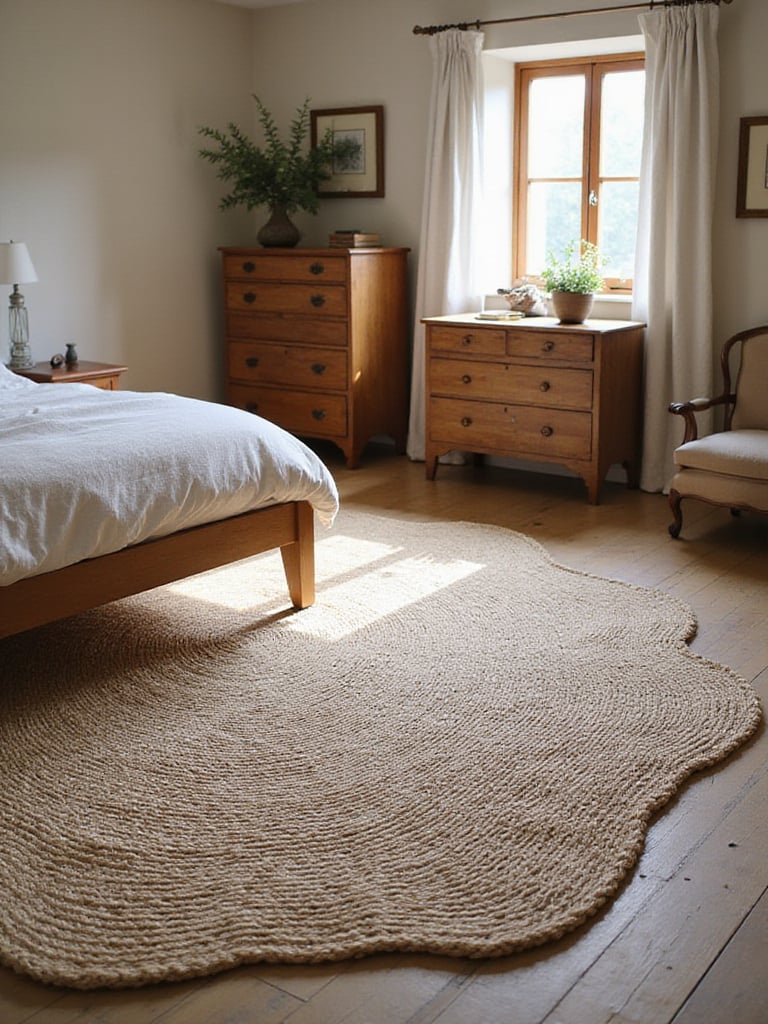
For this style, you want leather that shows its character. Look for full-grain leather in warm tones like cognac or chocolate brown that has natural variations. The beauty of quality leather is that, like a great piece of wood furniture, it develops a beautiful patina with age and use. Every mark and crease tells a part of its story.
Sometimes, the smallest details create the biggest impact on mood. Grouping a few old lanterns or simple mason jars and filling them with fairy lights or flameless LED candles creates an absolutely magical ambiance. It’s an unpretentious and incredibly charming way to add pools of soft, gentle light to your room.
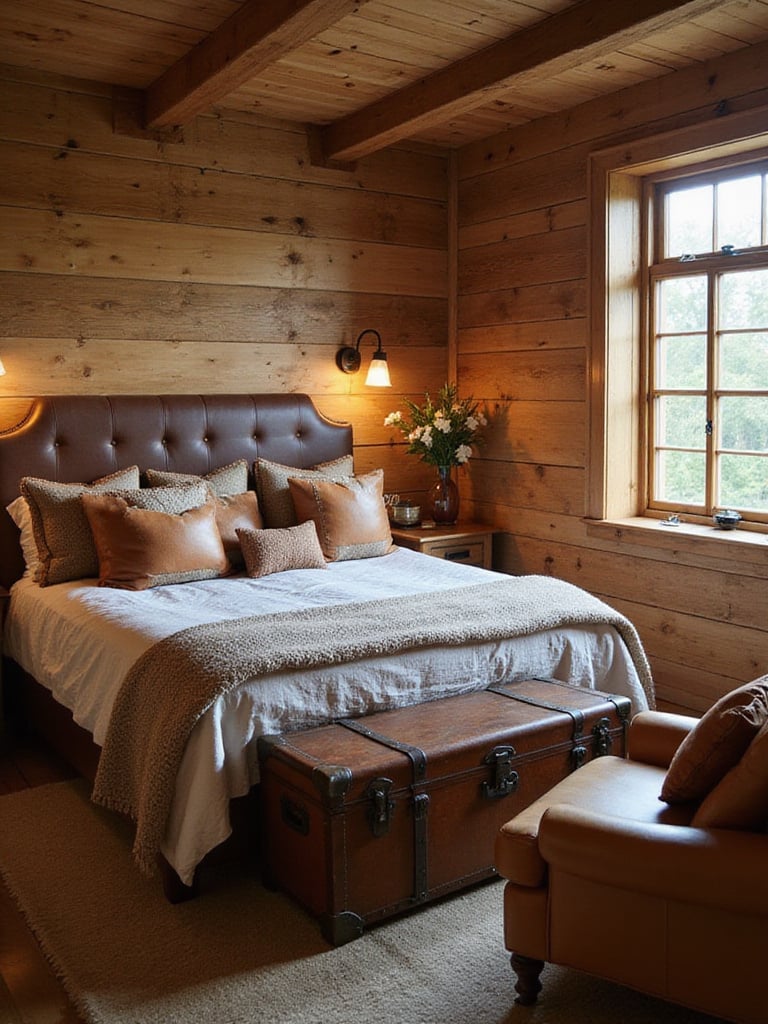
I love clustering a few lanterns of different sizes on the floor in a corner or lining a few mason jars up on a dresser or windowsill. That gentle, flickering glow at night is an immediate signal to your brain to relax and unwind. It’s a simple trick that taps into a nostalgic sense of comfort and security—exactly the feeling a rustic sanctuary should have.
A live edge shelf literally brings a slice of the forest into your room. Unlike standard, perfectly straight shelves, a live edge piece preserves the natural, organic line of the tree it came from. This creates an incredible focal point while also giving you a beautiful surface to display meaningful objects.
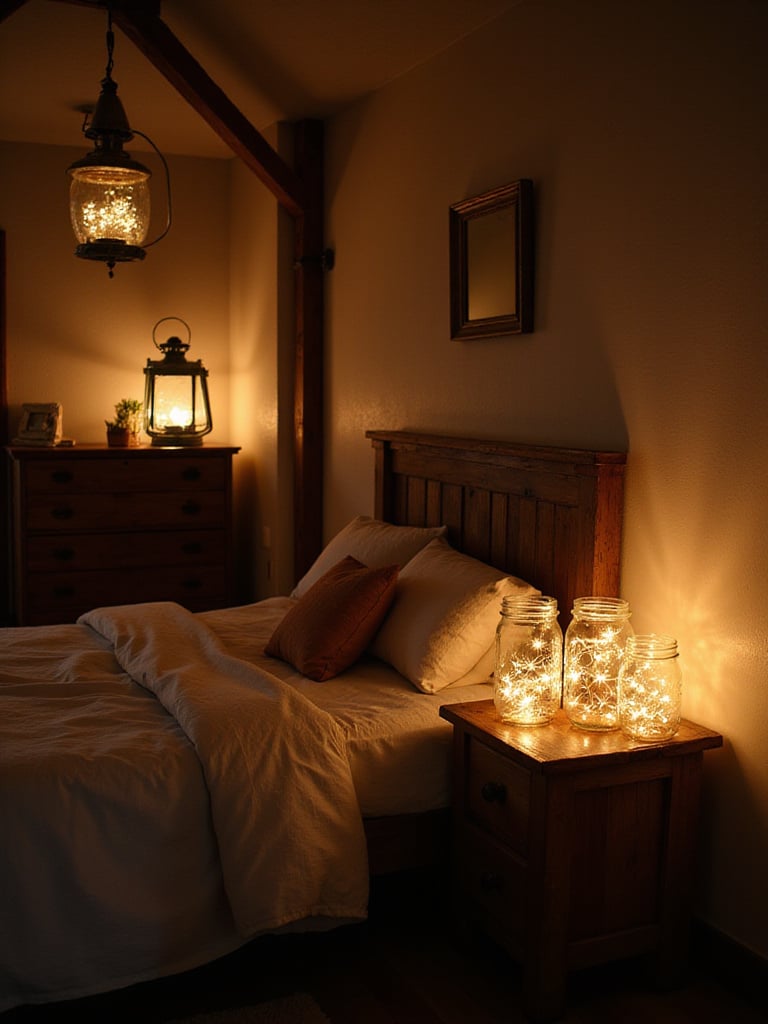
These shelves are perfect for showcasing small potted plants, a collection of interesting stones, a few favorite books, or some handcrafted pottery. They are often made from salvaged or sustainably harvested wood, meaning each one is completely unique. You can use them in place of a nightstand, above a dresser, or to fill an awkward corner, adding a piece of functional, natural sculpture to your walls.
Nothing creates a sense of rustic luxury quite like a fireplace in the bedroom. It immediately becomes the heart of the room, a focal point that’s both visually stunning and deeply comforting. The warm, flickering light of the flames—whether from a real wood-burning fireplace or a modern electric one—creates an ambiance that is simply unmatched.

Surround the fireplace with materials that enhance the rustic feel, like stacked stone, reclaimed brick, or a massive, rough-hewn wood mantel. A fireplace transforms the room into a true retreat, especially on cold nights. It provides both physical and emotional warmth, anchoring the space and making it the ultimate cozy haven.
A vintage trunk or antique chest is a fantastic multi-tasker in a rustic bedroom. It offers valuable storage while adding a huge dose of character and history. You can just feel the stories in the worn leather straps, the aged brass hardware, and the beautifully scuffed wood. That’s the kind of authentic patina that you can’t fake.
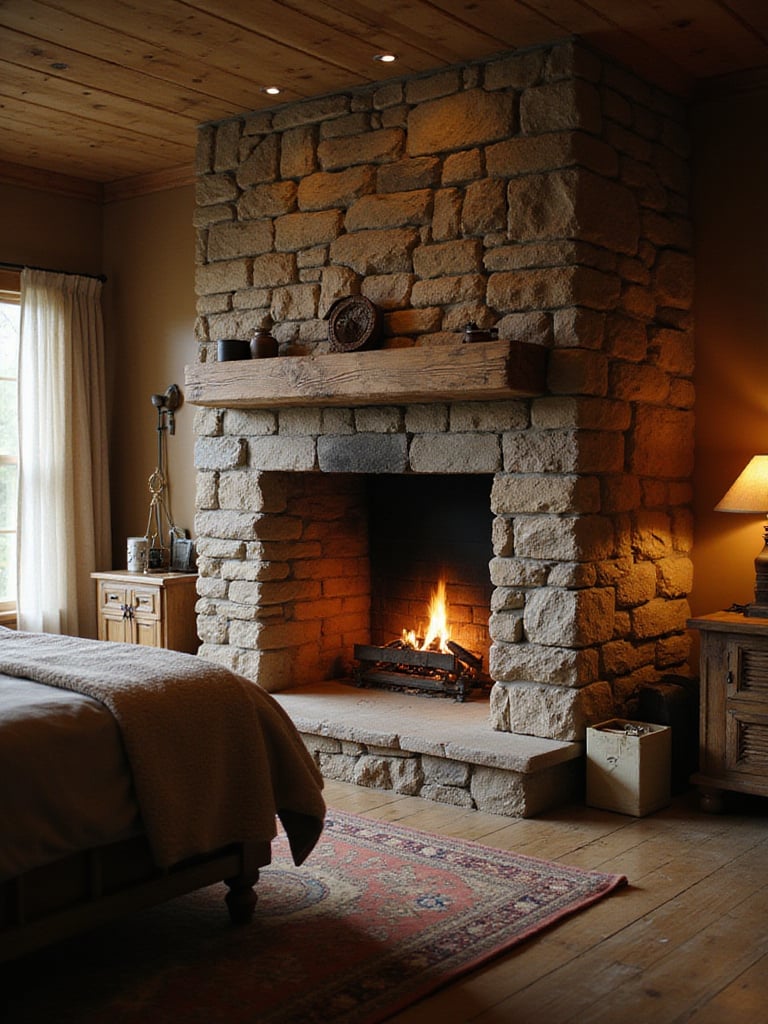
Their versatility is what I love most. A large trunk works perfectly at the foot of the bed for storing extra blankets and serving as a bench. A smaller chest can double as a unique nightstand. Inside, they’re perfect for stashing away things you don’t need every day—seasonal clothes, extra pillows, or treasured keepsakes.
This might sound counterintuitive, but one of the most important parts of a beautiful rustic design is empty space. It’s not about cold minimalism; it’s about giving your carefully chosen pieces room to shine. An uncluttered layout allows the natural textures and the quality of your furniture to be the focus.

The first rule I follow is to create clear, easy pathways for walking through the room. Choose fewer, better pieces of furniture rather than trying to fill every nook and cranny. Prioritize pieces that are both beautiful and functional. Restraint is what separates a thoughtfully designed rustic space from a cluttered, “themed” room. This negative space gives your eyes—and your mind—a place to rest.
Plants are the finishing touch that brings living energy into a rustic bedroom. They add a pop of vibrant color, soften the hard edges of wood and metal, and purify the air. Even if you don’t have a green thumb, there are plenty of hardy plants that thrive with minimal care.

A few great choices are snake plants, with their tall architectural leaves, or a trailing pothos that you can let drape over the side of a bookshelf. Placing your plants in simple terracotta or ceramic pots enhances the natural, earthy vibe. Houseplants don’t just look good; they can improve air quality and have a calming effect, making them active contributors to a healthier, more restful sleep environment.
A truly immersive space engages more than just your eyes. Introducing subtle, natural scents can complete the rustic experience. Fragrances like cedar, pine, sandalwood, lavender, or even a hint of vanilla can enhance the feeling of comfort and relaxation in your bedroom retreat.

But you don’t need artificial air fresheners. Think about incorporating scent in natural ways. A bundle of dried lavender or eucalyptus hanging on the wall, a few beeswax candles, or a small diffuser with essential oils are all wonderful options. These subtle aromas work in the background, deepening the sense of being in a calm, natural, and welcoming space.
Ultimately, crafting a rustic bedroom is a personal journey, not a race to a finish line. It’s about thoughtfully curating a space that feels like you—a room that celebrates the beauty of imperfection and the stories held within well-loved objects. It should be the place that welcomes you home at the end of a long day and helps you reconnect not just with nature, but with yourself. Let it evolve over time, and you’ll create more than just a beautiful room; you’ll design your own personal sanctuary.